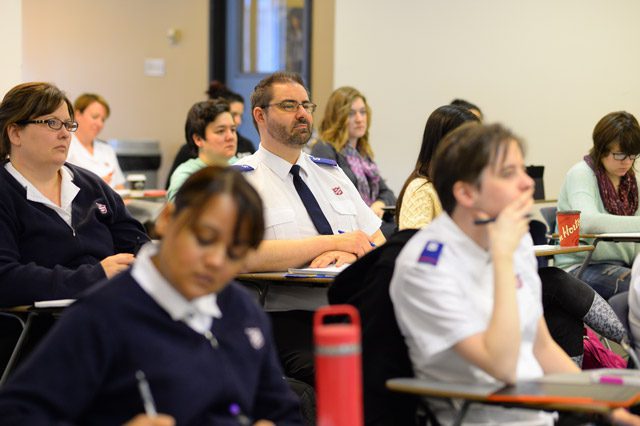A former Salvation Army Bible college has transformed itself into a Christian liberal arts university
When Dr. Marjory Kerr arrived on the campus of Booth University College in 2013 to assume her post as the school’s new vice president academic and dean, one thing quickly jumped out at her: almost every meeting she attended began with an invocation that included a prayer for Booth’s students.
“That really resonated with me,” she said. “How frequently our students are prayed for spoke volumes to me about the culture, the motivations and the perspective of Booth.”
The lifelong Salvationist and erstwhile consultant has since not only become steeped in Booth’s traditions, she’s now set to oversee the next step in its evolution. This summer, Kerr takes office as Booth’s fifth president and its first female one. Her appointment is just part of a wave of sweeping changes that have recently been remaking this school, which was founded by the Canada and Bermuda Territory of The Salvation Army in 1981.
Inspired by General William Booth’s desire for a “university of humanity,” Booth University College opened its doors as Catherine Booth Bible College in 1982, with just 28 students on its rolls. Around the turn of the millennium, however, the school began to rethink this narrow focus. The resulting overhaul of its curriculum was formally recognized in 2010, when the school officially adopted the “university college” moniker as a reflection of its continuing development into a broader liberal arts institution aligned with The Salvation Army’s Christian social justice tradition. It’s a move that’s begun to resonate in the world of Christian higher education.
Overall student enrollment has been trending downward for Christian schools across Canada in recent years. That’s not the case for Booth, however, where attendance has been on the rise every year since 2006. Administrators cite a number of factors contributing to the steady increase, the school’s growing reputation among them. “Our graduates are doing well [in the world],” Kerr said. “That comes out formally and informally.”
Moreover, who those students are is increasingly a reflection of multicultural realities. Part of the shift toward a liberal arts approach meant instituting an open enrollment policy, resulting in a more diverse student body, geographically and ethnically, as well as encompassing students of various faiths along with some who don’t adhere to any religious tradition. Though enrollment isn’t limited to Salvationists, the school still holds a unique relationship with The Salvation Army. As Chantel Burt, director of admissions, put it, “The Salvation Army has one university college in the world, and we’re it.”
“The Army ethos of hope, justice and mercy just saturates the place,” said Dr. Michael Boyce, an associate professor of English literature and chair of the English and Film Studies program. One way that manifests is in the implementation of a service learning course established as part of Booth’s core curriculum. In it “students learn about being the hands and feet in the world,” he said. “It’s a good example of how we bring together faith, academics and service.”
While the school’s location—situated in downtown Winnipeg, Canada, just an hour north of the U.S. border—offers as its backdrop a bustling city that National Geographic Traveler named a top destination of 2016, one of its main draws might actually be how little real estate it currently occupies.
Indeed, Booth’s community is so tight knit the majority of its classrooms are located in the same building as the school’s residence hall, where on-campus students can take advantage of the added perk of all single-occupancy rooms. The remaining classrooms are located just a few steps away in Booth’s new Petersen Hall building, which opened in 2015. Academically, this translates to a 12:1 student-to-faculty ratio, which has played a key role in its success to date.
As for the future, Booth hopes to continue to shape adults “informed by the discipline of their minds and transformed by Christian faith” as the school’s vision statement puts it. These are the students who will embody the the school’s new tagline “Education for a Better World.”
“That ‘better world’ is wherever our students are,” Kerr said. “And that’s an outcome of the experience they have at Booth University College.”












